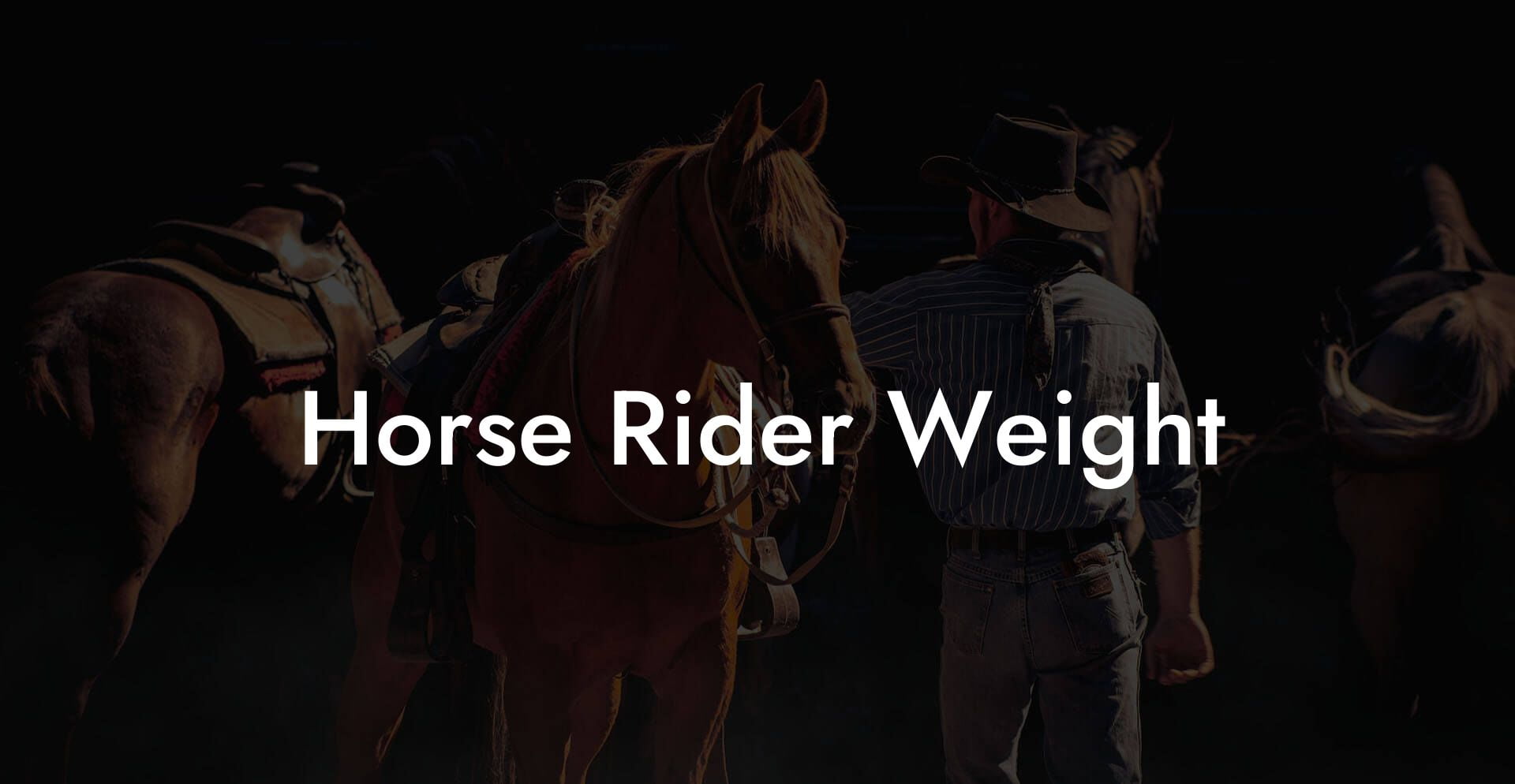Ever wondered if your riding skills might be secretly hampered by one overlooked factor? Let’s talk about horse rider weight, a topic that might sound like a niche statistic but is, in fact, the unsung hero of equine care and peak performance. Whether you’re a Gen-Z beginner or a millennial equestrian pro, understanding how your weight interacts with your horse can be both a game changer and a ticket to a more enjoyable riding experience.
Quick Links to Useful Sections
- Defining Horse Rider Weight: More Than Just Numbers
- Why Rider Weight Truly Matters for Your Horse
- The Science Behind Horse Rider Weight: Biomechanics 101
- Achieving the Optimal Rider Weight: Strategies and Tips
- Training Your Core and Enhancing Stability
- Adjusting Riding Posture for Optimal Distribution
- Strength and Flexibility: The Twin Pillars of Rider Fitness
- Proper Saddle Fitting and Equipment: Your Horse’s Best Friend
- nutrition and Fitness: A Dual Approach for Riders
- Myth-Busting: Rider Weight Misconceptions
- Equestrian Case Studies: Real-Life Transformations
- Case Study 1: Jen’s Journey from Friction to Freedom
- Case Study 2: Mark’s Makeover, From Doubt to Dynamic
- Case Study 3: Sarah’s Success Story in Tackling Myths
- Creating Your Personalized Rider Weight Action Plan
- Step 1: Assess Your Current Riding Style and Equipment
- Step 2: Set Achievable Goals
- Step 3: Integrate Core Strength, Flexibility, and Technique Adjustments
- Step 4: Invest in Quality Equipment
- Step 5: Monitor and Adjust
- Resources and Community Support: Your Next Steps
- FAQ: Your Horse Rider Weight Questions Answered
- Your Journey to an Empowered Equestrian Lifestyle
Defining Horse Rider Weight: More Than Just Numbers
When we say “horse rider weight,” it’s not just about the number on your scale, it's a full-on dialogue between you, your posture, your riding technique, and the saddle environment. Rider weight is a blend of your physical mass, how that weight is distributed while riding, and the specific mechanics of your posture and balance. It’s essential for ensuring that your horse remains comfortable, healthy, and ready to move gracefully.
In simple terms, the optimal rider weight ensures that the pressure on your horse’s back is evenly distributed, preventing injuries and facilitating optimal movement. It’s like a perfectly tuned duet, both the rider and the horse share a rhythm that only works when every element is in sync.
Whether you’re showing, jumping, or just enjoying a trail ride, understanding the dynamics of rider weight can help you and your horse perform at your best.
Why Rider Weight Truly Matters for Your Horse
Let’s get real: just as you wouldn’t want to wear shoes that don’t fit, your horse deserves a balanced load during every ride. Rider weight significantly influences your horse’s comfort, performance, and even long-term health. Here’s why:
- Back Health: Your horse’s back is delicate. Excessive or uneven pressure can lead to discomfort, muscle strains, and spinal issues. An optimally weighted rider helps maintain a healthy balance.
- Saddle Fit and Stability: The right rider weight ensures the saddle sits evenly on your horse. A poorly balanced rider, or one whose weight distribution is skewed, can throw off the saddle’s fit, leading to increased friction and abrasions.
- Performance and Agility: Balance directly affects your ability to communicate with your horse. When you’re light on your feet (or at least evenly balanced), you're more attuned to subtle cues, helping your horse perform agile movements efficiently.
- Prevention of Injuries: Both acute and stress-related injuries on your horse’s back can be mitigated when rider weight is optimized. Even distribution means less stress on any one area.
In a nutshell, the magic happens when rider and horse collaborate in harmony. Your weight is not just a number, it’s a factor that plays into every stride, every jump, and every gallop.
The Science Behind Horse Rider Weight: Biomechanics 101
Let’s dive into a bit of geeky fun, biomechanics! When you’re on a horse, your body acts as a living, breathing lever. The distribution of your weight affects the horse’s muscle engagement, gait, and even energy efficiency.
Here are some key components that come into play:
- Center of Gravity: Your center of gravity should align with your horse’s center of balance. When you shift, your weight follows suit, influencing how your horse moves. A low, centered posture can make all the difference.
- Biomechanical Feedback: Horses are extremely sensitive to pressure. When you naturally shift your weight in response to the horse’s movements, you not only provide necessary balance but also communicate subtle cues that enhance performance.
- Impact on Gait: Every movement you make, including the slightest lean, has a ripple effect on your horse’s gait. A balanced rider helps in maintaining a smooth, rhythmic stride, critical for both temperamental pleasure rides and high-demand competitions.
Understanding these fundamentals can help you make informed decisions on training, equipment, and even weight management. The goal? To ensure that both you and your horse move as one.
Achieving the Optimal Rider Weight: Strategies and Tips
Now that we’ve covered the basics, let’s talk strategy. How do you ensure that you and your horse are in sync? It starts with acknowledging the role of rider weight and then taking practical steps to optimize it.
Training Your Core and Enhancing Stability
A strong core is your best friend when it comes to balancing rider weight. Not only does it help you maintain proper posture, but it also minimises unnecessary shifting that can impact your horse’s comfort. Try these exercises:
- Planks: They’re not just for gym selfies, they build the muscular foundation that keeps you centered.
- Yoga: Precision movements and mindfulness help in fine-tuning your balance. Plus, you get to rock those trendy athleisure outfits.
- Pilates: Famous for enhanced core stability, Pilates can do wonders for your posture both on and off the saddle.
Remember, even micro-adjustments in posture can lead to a noticeable improvement in how your weight is distributed. A balanced core means improved communication with your horse and a ride that feels more natural.
Adjusting Riding Posture for Optimal Distribution
Good posture isn’t just for Instagram photos, it's essential for effective riding. Here’s what to keep in mind:
- Stay Relaxed: Tension in the shoulders or hips can lead to uneven weight distribution. Keep your muscles loose and let your seat sink in naturally.
- Engage Your Lower Body: A slight bend in the knees and a forward, engaged lower body can help distribute your weight more evenly, especially during dynamic movements.
- Eyes on the Horizon: Maintaining a forward gaze encourages a natural and balanced posture.
It might sound simple, but these small tips can lead to major improvements in how you ride and how comfortable your horse feels.
Strength and Flexibility: The Twin Pillars of Rider Fitness
Incorporating strength and flexibility routines into your training regimen can not only help you manage your weight better but also improve overall balance and coordination. Consider:
- Strength Training: Focus on exercises like squats, lunges, and resistance workouts to build muscle and keep your joints strong. A robust musculoskeletal system supports proper riding posture.
- Flexibility Routines: Stretching and mobility exercises ensure that your muscles remain supple. This flexibility is crucial for adapting to your horse's every move.
- Regular Conditioning: Activities like light jogging, cycling, or even brisk walking can help maintain an overall lean physique that complements riding dynamics.
The focus here isn’t just about losing weight, it’s about building a body that works seamlessly with your horse’s natural gait.
Proper Saddle Fitting and Equipment: Your Horse’s Best Friend
Even the best rider weight distribution can be negated by a poorly fitting saddle. Proper saddle fitting is an art and science. A saddle that fits poorly can lead to discomfort, pain, and even injuries for your horse.
Here’s what you need to know about saddle fitting:
- Customization Is Key: Every horse is unique in shape and size. A one-size-fits-all saddle is a myth. Ensure your saddle is custom-fitted to your horse’s back to avoid pressure points.
- Regular Check-Ups: Horses, much like people, have changing physiques. Regular saddle re-evaluations ensure ongoing comfort. Look for signs of rubbing, uneven wear, or shifts in seating comfort.
- Weight Distribution: The saddle design should support the rider’s weight evenly, this means wide panels and proper padding. Modern saddle designs often incorporate technologies to better distribute weight.
Remember, your equipment is as crucial as your technique. A well-fitted saddle not only minimizes the impact of rider weight but also enhances your horse’s performance and mood.
For many riders, investing in a top-notch saddle reassures peace of mind. When your equipment is on point, both you and your horse can focus on what really matters, the ride.
nutrition and Fitness: A Dual Approach for Riders
Let’s shift gears and talk about you, the rider. Your nutrition and overall fitness play key roles in achieving and maintaining the right rider weight. After all, a healthy rider equals a happy ride!
Consider these points:
- Balanced Diet: Emphasize lean proteins, whole grains, fruits, and veggies. Not only does a balanced diet help you maintain a healthy weight, but it also fuels your training and recovery.
- Hydration: Proper hydration is vital for muscle performance and joint lubrication. It helps sustain the energy required during long rides and vigorous training sessions.
- Regular Exercise Routine: Incorporate cardio, strength training, and flexibility workouts into your schedule. This not only aids in weight management but also builds the muscle endurance necessary for proper riding posture.
Combining equestrian practice with overall fitness routines creates a synergy that benefits both you and your horse. When your body is in top form, every ride becomes more enjoyable and efficient.
Myth-Busting: Rider Weight Misconceptions
There are plenty of myths floating around in the equestrian world about rider weight. Let’s debunk some common misconceptions:
- Myth #1: Only the Number Matters: Fact, rider weight is about more than just the scale. How you distribute your weight and your riding posture are equally important.
- Myth #2: Heavier Riders Are Always a Problem: Fact, when balanced properly with good technique and equipment, riders of various weights can ride successfully. It’s the balance and fit that count, not just the static number.
- Myth #3: You Must Drastically Lose Weight to Ride Well: Fact, focused training, proper posture, and correct equipment can often resolve issues without extreme weight loss. A holistic approach works best.
- Myth #4: Saddle Fitting Isn’t That Important: Fact, an ill-fitted saddle can magnify weight distribution issues, leading to discomfort and potential injury for your horse. Get that saddle checked!
These myths persist partly due to outdated practices and a lack of holistic perspective, but modern equestrian science shows that balance, technique, and overall health are far more important than a mere number on a scale.
Equestrian Case Studies: Real-Life Transformations
Nothing illustrates the impact of balanced rider weight better than real-world examples. Here are a few success stories that highlight how holistic attention to rider weight can transform the riding experience.
Case Study 1: Jen’s Journey from Friction to Freedom
Jen, an avid trail rider known for her energetic spirit, struggled with discomfort during long rides. After consulting with a specialist, she learned that her weight distribution was off. By integrating core-strengthening workouts, adjusting her riding technique, and investing in a custom-fitted saddle, Jen experienced a dramatic turnaround. Her horse’s performance improved, and rides became smoother, highlighting the transformative power of proper rider weight management.
Case Study 2: Mark’s Makeover, From Doubt to Dynamic
Mark, a competitive rider with years of experience, faced challenges during jumping events. Despite being fit, his posture was subconsciously slouching. A targeted training program that included Pilates, yoga, and professional saddle fitting helped him achieve a balanced center of gravity. Not only did he start clearing jumps with more ease, but his overall connection with his horse deepened. His journey is proof that even seasoned riders can find room for improvement in weight management and technique.
Case Study 3: Sarah’s Success Story in Tackling Myths
Sarah always believed that rider weight was a fixed predicament. After joining an equestrian wellness program, she discovered that slight improvements in her posture and regular conditioning exercises could counter many common issues. Through a combination of mindful riding, nutritional adjustments, and regular equipment checks, Sarah turned her riding challenges into a story of resilience and progress.
These case studies are a testament to the fact that with the right approach, one that incorporates training, proper equipment, and informed riding technique, both rider and horse can thrive.
Creating Your Personalized Rider Weight Action Plan
Ready to take control of your riding experience? Building a personalized action plan that addresses your specific needs is a smart move. Here’s how to craft a plan that keeps you and your horse moving in perfect harmony.
Step 1: Assess Your Current Riding Style and Equipment
Begin with an honest evaluation of your riding posture, the condition of your equipment, and your day-to-day habits. Consider having an expert assess your riding technique and saddle fit. Sometimes, a small tweak can lead to significant improvements.
Step 2: Set Achievable Goals
Define what success looks like for you. Do you want longer rides without discomfort? More precise control during jumps? Clearly lay down measurable goals, like improving core strength or fine-tuning your posture, so you can track your progress.
Step 3: Integrate Core Strength, Flexibility, and Technique Adjustments
Incorporate exercises that enhance core stability, such as planks, yoga, and Pilates, into your routine. Consider working with a coach or trainer who specializes in equestrian fitness to tailor a workout plan that suits your needs.
Step 4: Invest in Quality Equipment
Ensure your saddle and riding gear are up to the task. A custom-fitted saddle, padded riding boots, and well-designed tack can make a world of difference in how your weight affects your horse’s performance.
Step 5: Monitor and Adjust
Keep a journal of your rides, noting any shifts in comfort and performance. Regularly review your progress and don’t be afraid to tweak your plan as you and your horse evolve together.
A personalized rider weight action plan isn’t a one-and-done deal, it’s a dynamic process that adapts as you grow and as your partnership with your horse deepens.
Resources and Community Support: Your Next Steps
You’re not alone on this journey! There is a vibrant online and offline community dedicated to equestrian wellness and rider fitness. Here are some resources to help you take the next steps:
- Equestrian Forums and Facebook Groups: Join communities like The Equestrian Tribe or Saddle Up discussions to swap tips, experiences, and success stories.
- Professional Trainers: Look for certified riding instructors and equestrian fitness coaches who specialize in rider weight dynamics and overall equine care.
- Webinars and Workshops: Keep an eye out for events focusing on saddle fitting, rider biomechanics, and equestrian nutrition. These sessions are gold mines of practical advice.
- Online Courses and Apps: Platforms offering virtual coaching on riding posture, stability training, and even interactive saddle fitting guides can supplement your learning.
- Veterinary and Equine Specialist Networks: Utilize the knowledge of equine veterinarians and saddle fitters to better understand the nuances of how rider weight impacts your horse’s health.
Engaging with the community can help you refine your techniques, stay updated on the latest equestrian trends, and connect with likeminded riders who share your passion for both health and horsemanship.
FAQ: Your Horse Rider Weight Questions Answered
Dive into these frequently asked questions to get answers to some of the most common queries about rider weight and equine care.
1. What is meant by "horse rider weight"?
It refers to the combined impact of a rider’s body weight, their balance, and posture during riding, which collectively influence a horse’s comfort and performance.
2. How does rider weight affect my horse?
Improper weight distribution can lead to discomfort, cause uneven saddle pressure, and potentially result in back pain or long-term muscle strain in your horse.
3. Can a rider of any weight ride a horse?
Yes! With the right riding techniques, proper training, and a well-fitted saddle, riders of various body types can ride comfortably. It’s all about balance and technique.
4. How can I improve my riding posture?
Focus on core strengthening, flexibility exercises like yoga or Pilates, and consider working with a riding coach to refine your posture.
5. Is there an ideal weight ratio between rider and horse?
There isn’t a one-size-fits-all ratio, but typically, it’s recommended that the rider’s weight does not exceed 20% of the horse’s body weight. However, factors like saddle fit and rider technique also play crucial roles.
6. What should I do if I’m concerned about my impact on my horse?
Consult with a professional equestrian trainer or saddle fitter. They can assess your riding style, equipment, and help recommend strategies for optimal weight distribution.
7. Are there specific exercises for improving riding balance?
Absolutely. Core training, balance exercises, yoga, and Pilates are excellent for building the strength and awareness needed to maintain a balanced position while riding.
8. Can proper nutrition help manage rider weight?
Yes, maintaining a balanced diet and proper hydration contributes to overall fitness and helps you achieve optimal rider weight while supporting your performance.
Your Journey to an Empowered Equestrian Lifestyle
Embracing the insights of optimal horse rider weight is about more than just numbers, it’s a holistic approach to refining the art and science of riding. When you invest in your fitness, adjust your posture, fine-tune your equipment, and join a community of like-minded riders, you’re setting the stage for a truly empowered equestrian experience.
With every ride, let your focus be on creating harmony between you and your horse. Celebrate the small wins, a better balance, a more comfortable ride, or even just that improved connection, and let these victories drive you forward.
Your journey to a more adept riding experience starts now. Be it through targeted fitness drills, improved saddle fitting, or joining a community for support, each step is a leap towards a confident, balanced, and fulfilling equestrian lifestyle.
So saddle up, get inspired, and ride on with the knowledge that every thoughtful adjustment you make echoes in your horse’s graceful stride. Your path to an empowered equestrian lifestyle is uniquely yours, own it, celebrate it, and enjoy every moment of the ride!













